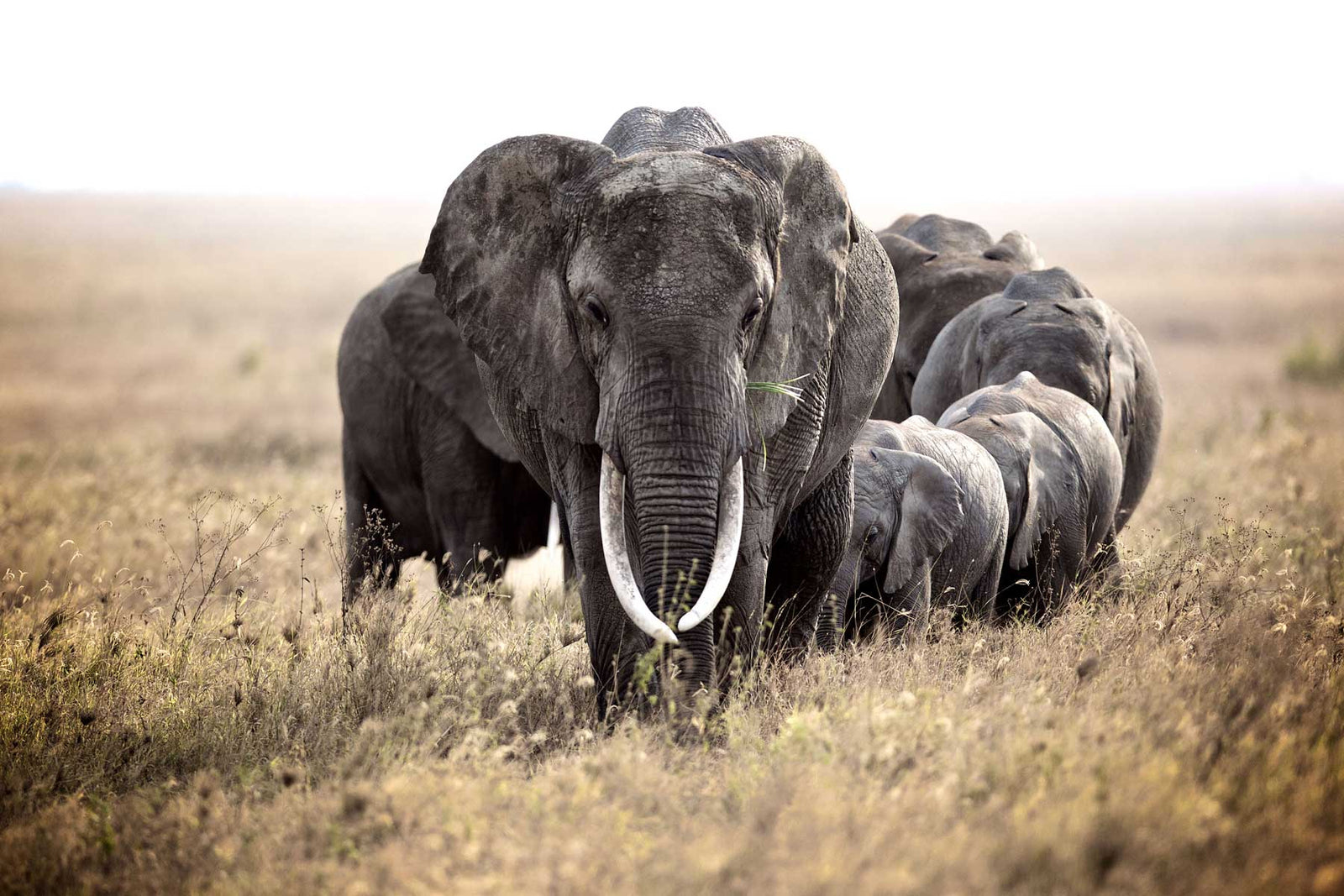Your Cart is Empty
 African bush elephants are the largest land animals in the world. Males can grow up to whopping 13 feet tall at the shoulders and measure up to 30 feet from trunk to tail. As for their weight, you’re talking 6,350 kg. Their trunk alone weighs 400 pounds and contains 40,000 different muscles! It’s no wonder why they can’t jump, can you imagine trying to lift all of that weight? Don’t be fooled though – these giants are capable of running up to speeds of 40 km per hour.
African bush elephants are the largest land animals in the world. Males can grow up to whopping 13 feet tall at the shoulders and measure up to 30 feet from trunk to tail. As for their weight, you’re talking 6,350 kg. Their trunk alone weighs 400 pounds and contains 40,000 different muscles! It’s no wonder why they can’t jump, can you imagine trying to lift all of that weight? Don’t be fooled though – these giants are capable of running up to speeds of 40 km per hour.
 Their ancient-looking skin holds more than meets the eye. The deep wrinkles are significant for keeping their skin healthy by locking in moisture. After a deep cleanse in a mud bath, the creases in the skin trap and retain the moisture, helping to keep the elephant’s skin soft and supple. Despite being an inch thick, their skin is loaded with nerve endings, making it really sensitive. Elephants from the same herd use these nerve endings to communicate with one another, including wrapping their trunks around each other or giving greeting taps on their bodies.
Their ancient-looking skin holds more than meets the eye. The deep wrinkles are significant for keeping their skin healthy by locking in moisture. After a deep cleanse in a mud bath, the creases in the skin trap and retain the moisture, helping to keep the elephant’s skin soft and supple. Despite being an inch thick, their skin is loaded with nerve endings, making it really sensitive. Elephants from the same herd use these nerve endings to communicate with one another, including wrapping their trunks around each other or giving greeting taps on their bodies.
A century ago, over five million elephants roamed Africa. Today, there are less than half a million. It is estimated that, on average, at least 55 elephants are killed by poachers every day, just for their tusks!. The worst thing about it is that poachers target the ones with the biggest tusks, who happen to be the oldest. By killing old elephants, particularly females and mothers, not only are their offspring orphaned, but all the wisdom they would’ve shared is lost, too. Unless poaching is stopped, it could only be a couple more decades before elephants disappear entirely from Africa.

Image: Kenya burns 105 tons of confiscated ivory in protest of elephant poaching.
Kenya’s Nairobi National Park, 2016
 Elephants are herbivores. To grow so large they pack away plant protein in huge volumes. They need to consume 130-180 kg of food per day ranging from grasses, leaves, bamboo, banana, sugarcane bark and roots. Their ultimate favourite crop is the sweet marula fruit. But what about the consequences of all that food? Over 100 kg of manure a day.
Elephants are herbivores. To grow so large they pack away plant protein in huge volumes. They need to consume 130-180 kg of food per day ranging from grasses, leaves, bamboo, banana, sugarcane bark and roots. Their ultimate favourite crop is the sweet marula fruit. But what about the consequences of all that food? Over 100 kg of manure a day.
 They play a HUGE role in shaping the environment. They change landscapes, create new ones, spread seeds from the plants they eat, and their dung fertilises the soil with nutrients that encourage the seeds to grow and flourish.
They play a HUGE role in shaping the environment. They change landscapes, create new ones, spread seeds from the plants they eat, and their dung fertilises the soil with nutrients that encourage the seeds to grow and flourish.

Buy elephant-friendly coffee and wood
 Coffee and timber crops are often grown in plantations that destroy crucial elephant habitats. Make sure to buy Forest Stewardship Council (FSC) certified timber and certified fair trade coffee. Look out for the FSC logo, if your coffee or timber doesn’t have it, don’t buy it. Find out more here.
Coffee and timber crops are often grown in plantations that destroy crucial elephant habitats. Make sure to buy Forest Stewardship Council (FSC) certified timber and certified fair trade coffee. Look out for the FSC logo, if your coffee or timber doesn’t have it, don’t buy it. Find out more here.
Don’t buy, sell or wear ivory
New ivory is strictly banned, but antique ivory can be legally available for purchase. Shunning antique ivory is a clear message to dealers that the material is not in demand.
Support Roots and Shoots
 Founded in 1991 by Dr. Jane Goodall, Roots & Shoots is a youth program created to incite positive change and get youth involved in conservation activities and careers to help protect elephants and other endangered species. The programme welcomes primary children to university students. Get involved here.
Founded in 1991 by Dr. Jane Goodall, Roots & Shoots is a youth program created to incite positive change and get youth involved in conservation activities and careers to help protect elephants and other endangered species. The programme welcomes primary children to university students. Get involved here.
Comments will be approved before showing up.
Our Animal Besties writing contest from 'Nature's Best Buddies' issue brought in a flood of heartwarming, imaginative and often hilarious tales of unexpected friendships. From swans befriending capybaras to chickens bonding with foxes, your entries were full of surprise, kindness and creativity. A h...
January’s JAWsome Creatures competition brought some of the most imaginative and fearsome designs we've ever seen! From predators with sabre-like teeth to extraordinary beaks with unique feeding tricks, your entries were truly jaw-dropping. A huge thank you to everyone who took part – we loved seeing your wild and wonderful creations!
The Wildlife Photographer of the Year competition, produced by the Natural History Museum, never fails to amaze, and 2024 was no exception. Thousands of incredible images were submitted, but only a few made it to the People’s Choice Award.



